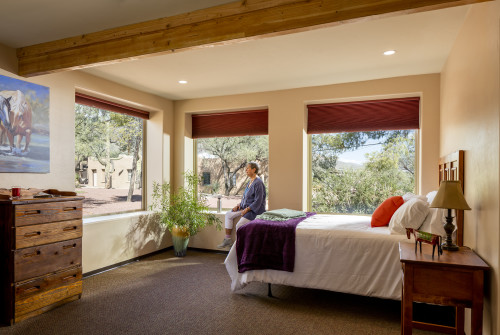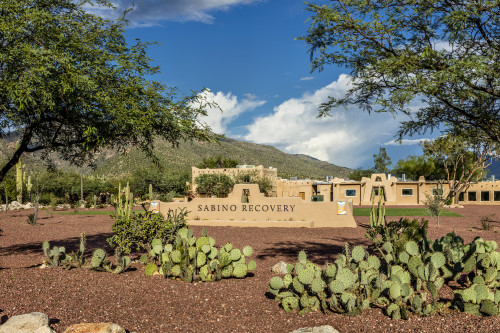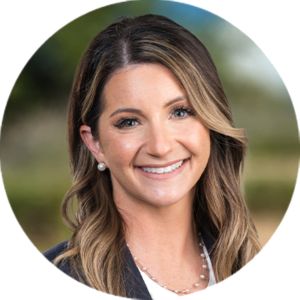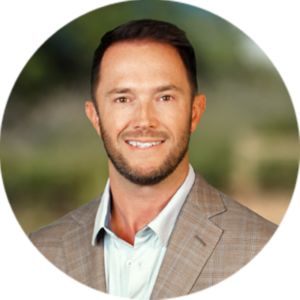






Sabino Recovery
Verified Center
This provider's information has been quality-checked by Recovery.com's Research Team for accuracy and completeness, including center verification through appropriate third-party organizations.
Treatment Focus
This center treats substance use disorders and mental health conditions. You'll receive individualized care catered to your unique situation and diagnosis, learn practical skills for recovery, and make new connections in a restorative environment.
Primary Level of Care
Offering intensive care with 24/7 monitoring, residential treatment is typically 30 days and can cover multiple levels of care. Length can range from 14 to 90 days typically.
Treatment Focus
This center treats substance use disorders and mental health conditions. You'll receive individualized care catered to your unique situation and diagnosis, learn practical skills for recovery, and make new connections in a restorative environment.
Primary Level of Care
Offering intensive care with 24/7 monitoring, residential treatment is typically 30 days and can cover multiple levels of care. Length can range from 14 to 90 days typically.
Private Pay
You pay directly for treatment out of pocket. This approach can offer enhanced privacy and flexibility, without involving insurance. Exact costs vary based on program and length of stay. Contact the center for specific details.
Sabino Recovery
Sabino Recovery
About Sabino Recovery
Sabino Recovery helps clients pursue not just recovery but true transformation. Their luxury inpatient treatment center in the Sonoran Desert provides a truly individualized experience for clients struggling with addiction and co-occurring mental health conditions. Shaped by the latest research in neuroscience, they tailor both naturopathic and allopathic medical practices to ensure clients receive comprehensive care. Clients will appreciate not only the serene setting in the Catalina foothills, but also the enriching activities that invigorate the mind, body, and spirit.
Evidence-Based, Trauma-Informed Care
Sabino Recovery employs an evidence-based treatment model focused on trauma-informed care. It aims to fully address trauma as a way to diminish symptoms, reduce shame, and increase empathy and safety. Their programming is individualized at the highest level: each treatment regimen is based on the entire person, not just the diagnosis. Upon admission, an in-depth assessment provides staff with the client’s unique history and circumstances. Clients have lab work and non-invasive exams done to better inform clinical decisions, and the team takes into account clients’ day-to-day circumstances to guide each daily treatment plan. Every therapeutic modality used is informed by neuroscience, from evidence-based methods like cognitive behavioral therapy (CBT), dialectical behavioral therapy (DBT), and neurofeedback, to integrative therapies such as massage, art therapy, outdoor adventure, and yoga. The Sabino Recovery team consists of naturopathic and allopathic professionals, including psychiatrists and psychologists. Members of the neurofeedback and sleep study programs in particular are thought leaders in their fields. Every staff member has been carefully selected, not only for their experience and skill, but also for possessing a great deal of empathy and compassion.
Intensive 1-on-1, Group, and Family Sessions
Because each person’s history is so distinctive, Sabino Recovery offers 50 one-on-one sessions in just 35 days. This allows their multidisciplinary team to work with each resident on their specific issues, and address the root cause of their struggles and not just the symptoms. Their group sessions have no more than 8 participants, ensuring each person is able to give feedback and be heard. Near the end of a client’s program, family members are invited to participate in the family program. This 3.5-day program is designed to reconnect clients with the people most important to their recovery. Through guided exercises, families gain insights into their dynamics and learn to communicate effectively.
Continuing Care and Aftercare
During treatment, clients meet weekly with the Continuing Care Coordinator for interactive and educational sessions about the importance of ongoing care. Clients create a sustainable, recovery-focused, self-care plan with healthy habits and support networks. Sabino Recovery’s well-designed aftercare program may include medication management, individual therapy, and partial hospitalization or outpatient treatment to reduce the risk of relapse. Their free lifelong alumni program provides individualized follow-up, structured group weekly Zoom calls, and alumni reunions.
Peaceful Setting with Upscale Amenities
Set against the serene backdrop of Sabino Canyon in Tucson, Sabino Recovery’s campus-style environment at the base of the Santa Catalina Mountains maintains an intimate feel. They offer private suites and shared rooms, gourmet meals crafted by an in-house chef, and a fully equipped gym. Clients enjoy peaceful labyrinth walks, acupuncture, cupping, sauna retreats and cold-water plunges. The grounds also include a bookstore, relaxing courtyard, swimming pool, ropes course, basketball and pickleball courts, and a music recording studio. Cell phone and laptop usage are monitored and only available during specific hours.

Center Overview
Treatment Focus
This center treats substance use disorders and mental health conditions. You'll receive individualized care catered to your unique situation and diagnosis, learn practical skills for recovery, and make new connections in a restorative environment.
CARF Accredited
CARF stands for the Commission on Accreditation of Rehabilitation Facilities. It's an independent, non-profit organization that provides accreditation services for a variety of healthcare services. To be accredited means that the program meets their standards for quality, effectiveness, and person-centered care.
Pricing and Program Length
Estimated Center Costs
The cost listed here ($45,000+), is an estimate of program cost. Center price can vary based on program and length of stay. Contact the center for more information. Recovery.com strives for price transparency so you can make an informed decision.
Luxury rehab centers offer a unique blend of luxurious amenities and high-quality treatment. From private suites to gourmet dining, personal trainers to spa treatments, these facilities provide a high level of comfort and discretion.

Meet Your Care Team

Andréa Copeland
Neurotherapist
M.S

Andrea Hovden-Hall
Continuing Care Manager
B.S

Anthony Cuevas
BHT

Bri Arellano
Family Therapist
LMSW

Brittany Kasprzyk
Physician Assistant
PA-C

Catherine Devoucoux
Principal Neurofeedback Specialist
BSHS

Dr. Erik Vose
Naturopathic Physician
NMD

Dr. Kristine T. Norris
Medical Director

Kendall Jordan
Primary Therapist
LMSW, EMDR Trained, DBR Trained

Leslie Donnely
Psychologist/EMDR Certified
PHD

Lia Bueno
BioEnergetics Medicine Provider

Lori Key
BHT

Lydia Suitt
Clinical Therapist
LAC, EMDR Trained

Marissa Cavenagh
Director of Nursing
BSN, RN

Michael Newton
Float Therapist
MA, MS, LASAC

Param Dedhia
Sleep Specialist
MD

Pat Thurman
Clinical Therapist
LPC-S, LPAT, LMHC, CSAT, ATRS

Paula Bassett
BHT

Rachel Master
Registered Dietitian
RD, LDN, CEDS

Randy Rutherford
Primary Therapist
LASAC

Renee Brenteson
Massage Therapist, Reiki Master, Craniosacral Practitioner

Renita Thomas
Primary Therapist
LAC

Rosalind Perera
Clinical Therapist
MSW, LMSW, NBHWC

Roy M. Serpa
Chairman of the Board

Ryan Young
Executive Director

Scott Hillsman
Acupuncturist, Traditional Asian Medicine & Qi Gong Practitioner

Scott Huffman
BHT

Shara Turner
Clinical Director
LPC, MSC, NCC, NARM

Stephanie Wallace
Physician Assistant
PA-C

Steven Goldsmith
Admissions Director

Tana Von Isser
Lead Primary Therapist
LMSW, CHT

Thomas Isbel
Co-Founder & CEO

Trish Seek
Clinical Therapist
LPC,SEP




Levels of Care







Your Care Options
Specializations
Alcohol
Using alcohol as a coping mechanism, or drinking excessively throughout the week, signals an alcohol use disorder.
Anxiety
Anxiety is a common mental health condition that can include excessive worry, panic attacks, physical tension, and increased blood pressure.
Co-Occurring Disorders
A person with multiple mental health diagnoses, such as addiction and depression, has co-occurring disorders also called dual diagnosis.
Executives
Executive treatment programs typically directly support the needs of people who manage businesses and may provide flexible schedules and office space to allow work during treatment.
Licensed Primary Mental Health
Some primary care providers offer mental health diagnosis and treatment. This can prevent patients from developing more serious conditions.
Opioids
Opioids produce pain-relief and euphoria, which can lead to addiction. This class of drugs includes prescribed medication and the illegal drug heroin.
Professionals
Busy, high-ranking professionals get the personalized treatment they need with greater accommodations for work, privacy, and outside communication.
Trauma
Some traumatic events are so disturbing that they cause long-term mental health problems. Those ongoing issues can also be referred to as "trauma."
Who We Treat
Older Adults
Addiction and mental health treatment caters to adults 55+ and the age-specific challenges that can come with recovery, wellness, and overall happiness.
Executives
Executive treatment programs typically directly support the needs of people who manage businesses and may provide flexible schedules and office space to allow work during treatment.
Young Adults
Emerging adults ages 18-25 receive treatment catered to the unique challenges of early adulthood, like college, risky behaviors, and vocational struggles.
LGBTQ+
Addiction and mental illnesses in the LGBTQ+ community must be treated with an affirming, safe, and relevant approach, which many centers provide.
Men and Women
Men and women attend treatment for addiction in a co-ed setting, going to therapy groups together to share experiences, struggles, and successes.
Midlife Adults
For adults ages 40+, treatment shifts to focus on the unique challenges, blocks, and risk factors of their age group, and unites peers in a similar community.
Mild Disabilities
Adults with mild physical or intellectual disabilities receive treatment catered to their specific needs in a safe and clinically supportive environment.
Approaches
Evidence-Based
A combination of scientifically rooted therapies and treatments make up evidence-based care, defined by their measured and proven results.
Holistic
A non-medicinal, wellness-focused approach that aims to align the mind, body, and spirit for deep and lasting healing.
Personalized Treatment
The specific needs, histories, and conditions of individual patients receive personalized, highly relevant care throughout their recovery journey.
Therapies
1-on-1 Counseling
Patient and therapist meet 1-on-1 to work through difficult emotions and behavioral challenges in a personal, private setting.
Meditation & Mindfulness
A practiced state of mind that brings patients to the present. It allows them to become fully aware of themselves, their feelings, and the present moment.
Trauma-Specific Therapy
This form of talk therapy addresses any childhood trauma at the root of a patient's current diagnosis.
Mindfulness Therapy
This ancient practice can be mental, emotional, and even spiritual. In meditation, you focus your attention on the present moment without judgement.
Adventure Therapy
This experiential approach uses the physical and emotional challenges of outdoor activities as tools for personal growth.
Attachment-Based Family Therapy
ABFT is a trauma-focused therapy that teaches you to form healthy relationships by rebuilding trust and healing attachment issues formed in childhood.
Animal Therapy
Animals can inspire trust and self-worth. In this experiential therapy, guided interactions are used to improve social skills and emotion regulation.
Art Therapy
Visual art invites patients to examine the emotions within their work, focusing on the process of creativity and its gentle therapeutic power.
Conditions We Treat
Grief and Loss
Grief is a natural reaction to loss, but severe grief can interfere with your ability to function. You can get treatment for this condition.
Personality Disorders
Personality disorders destabilize the way a person thinks, feels, and behaves. If untreated, they can undermine relationships and lead to severe distress.
ADHD, ADD
ADHD is a common mental health condition caused by dopamine imbalance. Common symptoms include inattention, hyperactivitiy, and impulsivity.
Anger
Although anger itself isn't a disorder, it can get out of hand. If this feeling interferes with your relationships and daily functioning, treatment can help.
Anxiety
Anxiety is a common mental health condition that can include excessive worry, panic attacks, physical tension, and increased blood pressure.
Bipolar
This mental health condition is characterized by extreme mood swings between depression, mania, and remission.
Burnout
Burnout entails mental and physical exhaustion, and leads to a severe lack of fulfillment. This condition is often caused by overwork.
Codependency
Codependency is a pattern of emotional dependence and controlling behavior. It's most common among people with addicted loved ones.
Substances We Treat
Alcohol
Using alcohol as a coping mechanism, or drinking excessively throughout the week, signals an alcohol use disorder.
Benzodiazepines
Benzodiazepines are prescribed to treat anxiety and sleep issues. They are highly habit forming, and their abuse can cause mood changes and poor judgement.
Chronic Relapse
Consistent relapse occurs repeatedly, after partial recovery from addiction. This condition requires long-term treatment.
Co-Occurring Disorders
A person with multiple mental health diagnoses, such as addiction and depression, has co-occurring disorders also called dual diagnosis.
Cocaine
Cocaine is a stimulant with euphoric effects. Agitation, muscle ticks, psychosis, and heart issues are common symptoms of cocaine abuse.
Drug Addiction
Drug addiction is the excessive and repetitive use of substances, despite harmful consequences to a person's life, health, and relationships.
Ecstasy
Ecstasy is a stimulant that causes intense euphoria and heightened awareness. Abuse of this drug can trigger depression, insomnia, and memory problems.
Heroin
Heroin is a highly addictive and illegal opioid. It can cause insomnia, collapsed veins, heart issues, and additional mental health issues.
Psychedelics
Hallucinogenic drugs—like LSD—cause euphoria and increased sensory experiences. When abused, they can lead to depression and psychosis.
Languages
Aftercare
Care Designed for Your Needs
Personal Amenities
Amenities
Special Considerations
Center Pets
Addiction and mental health facilities with pets allow patients to interact with friendly dogs, cats, horses, and in some cases, even dolphins.
Pet Friendly
For greater comfort and healing, pet-friendly treatment centers welcome dogs and animal companions to stay with their owners while they attend treatment.
Family Member Stays
Treatment providers welcome family members to stay on-site to better the experience and success of patients and their families as a whole.
Flexible technology policies
Centers with flexible technology policies allow professionals to stay in touch with work and give patients a greater sense of connection and normalcy.
Activities
Yoga
Yoga is both a physical and spiritual practice. It includes a flow of movement, breathing techniques, and meditation.
Off-Site Activities
What people are saying
Treatment
4.4
Accommodations
4.7
Food & Nutrition
4.7
Value
4.6
Jen
Reviewed 07/05/25
Review from Rehabs.com
Vanessa Colr
Reviewed 02/09/23
Review from Rehabs.com
M.K.
Reviewed 05/07/19
Review from Rehabs.com
DHF
Reviewed 08/06/18
Review from Rehabs.com
CF
Reviewed 08/06/18
Review from Rehabs.com






